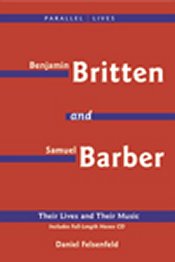Felsenfeld in his introduction does offer two reasonable rationales for putting Britten and Barber side-by-side. Both composers stayed with their established styles — to some degree astringent but essentially tonal — as the avant-garde established dominance in the 1950s and '60s. Both were gay men, as well. Beyond that, little connects the two men. They apparently never met, let alone had any type of professional relationship.
The result, as the reader pages through alternating essays on each composer's life and work, is an intellectual case of "tennis match" neck, with any literary momentum achieved with one composer quickly evaporating with the next chapter on the other.
Felsenfeld seems most concerned with setting these two men up against composers such as Boulez and Stockhausen (named by the author in the "How to Listen' opening essay). The latter names represent a whole school for Felsenfeld whose compositions of "surface complexity" are as attractive as physics to the math-challenged. The critics who supported these composers, or who, in Felsenfeld's inelegant phrase, "leapt on their mercurial bandwagons," share equal blame for the current state of classical music, which Felsenfeld sees as alienated from its core audience.
Since neither Barber nor Britten ever became greatly beloved composers, though both have secure reputations, this angle tends to place the men in a no-man's-land, caught between limited popular appeal and modernistic scorn. Surely both composers deserve to more generously analyzed strictly on the basis of what they sought to achieve and how much they accomplished.
Most of the first half of this book is given over to biographical sketches. Sketchy, indeed. Some are no longer than two pages, and this is a book of relatively large print.
The center of the book contains two essays, one for each composer. The titles give a fair idea of the content here: "Dare not Speak Its Name" for Britten and for Barber, "A Truly Perfect Failure: Antony and Cleopatra at the Metropolitan." The Britten essay can't offer much more than unelucidating conjecture ("Britten, undoubtedly, knew the consequences of his actions and therefore probably never acted."), and it ends with a pale argument that the questions regarding Britten's sexuality are relevant to an understanding of the music. Since the questions mostly remain unanswerable, perhaps the point is moot.
With Barber, focusing on his last major work and its unfortunate premiere leaves the reader with a sad image of a defeated man and a lost reputation. The story of that final opera has many points of interests; surely it shouldn't have been the only essay provided on Barber's career, however.
The last section of the book ties into the provided CD. Felsenfeld offers his close analysis of such pieces as Britten's Serenade for Tenor, Horn and Strings and Barber's Second Essay for Orchestra. Perhaps the strongest part of the book, these essays walk a line between rigorous academic analysis and over-simplified commentary. Combined with the CD of mostly effective performances culled from the Naxos catalogue, this section may be quite useful to some readers. Once again, however, no meaningful topics related to a "parallel" discussion of the two composers appear, calling into question the whole point of the volume.
A stronger recommendation for those with a strong interest in either composer would be for separate volumes, but for a brief overview of the lives and issues of Britten and Barber, Felsenfeld's book makes an adequate, if insubstantial and occasionally clumsy, choice.
Chris Mullins
Los Angeles Harbor College
Click image to purchase book.
